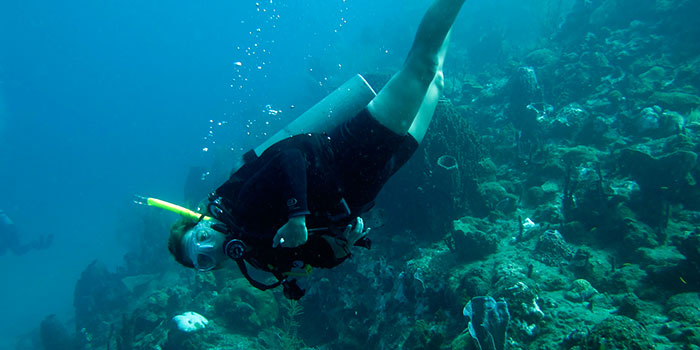Christina Kellogg: Video Transcript
Hear Christina talk about her job. Download (mp4, 124 MB).
Introduction
My name is Dr. Christina Kellogg. My current title is Research Microbiologist. I work for the U.S. Geological Survey. We’re part of the Department of Interior.
About Christina’s Job
I do classical microbiology, which means I try and culture microbes like bacteria and fungi from the environment, from water, from air, from sediments, from corals. I also use molecular techniques which usually means we take the DNA out of a sample, whether it was water or sediment or coral, and use sequencing to look for different microbes that might be living in those samples.
Job Requirements
The educational requirements for my job are a PhD and post-doctoral experience.
I typically work a 40-hour week.
I do get to travel a lot in my job and it’s one of my favorite things. I travel to do field work, so to collect samples. And I’ve been to places including the Aleutian Islands, Barbados, the Gulf of Mexico, the Virgin Islands, American Samoa. And I also travel to attend conferences, to present my work. So I’ve been to China and Germany and Norway, the Netherlands, and all over the United States.
Love What You Do…
I think whether someone is going into science or something else, it’s really important to love what you do. If you don’t love doing it, especially even the tedious parts, you’ll never be able to enjoy your work enough to stay with it, especially in something like science where it’s kind of a long haul through graduate school into the career of your choice.

From working in the lab, conducting field work, participating in research cruises, and traveling the world, Christina's job takes her far and wide to better understand microbes.
Benefitting the Public
My work benefits the public by expanding our understanding of biodiversity, obviously at the microbial level, and also by helping tease apart one small part of the puzzle that makes up coral ecosystems.
Some Job Perks
The personal rewards of my work are, one, that I really, I love my job, mostly because of the variety. Sometimes I’m working in the lab; sometimes I’m in the field, traveling, collecting samples; and that I get to travel all over the world. Also that, in the course of my work, I meet and work with so many other scientists who are passionate about what they do and that makes it really exciting. But, the travel all over the world is a huge bonus.
I think the most fascinating thing I’ve done during my career has been that I had the opportunity to ride in both the Delta and Johnson SeaLink submersibles, to actually go underwater and collect my own deep-sea corals. Because it was really amazing to be thousands of feet under the ocean, actually seeing these deep-sea corals in their natural environment and knowing that on any dive, I might be seeing something that no other person had ever seen before.
Other Options
Because the microbiological and molecular techniques I use in the environment are basically the same as what you would use in a clinical setting, you could also work, potentially, in a clinical laboratory or a biotechnology company or a pharmaceutical company. Or also, because of my academic studies, I could also teach at a high school, community college, or university level.
Undergrad Experience
Looking back, there’s nothing I would have changed in my sort of career path, but it really would have been nice if I’d had an opportunity to do research as an undergraduate. As it was, I had a work-study job in an office, and that was fine, but I really think having an undergraduate laboratory experience gives you a huge edge in graduate school and really helps you figure out whethter it’s something you’re going to love or not before you’ve made that time and financial commitment to graduate school.
And so, because I think it is so important, I try and make that opportunity available in my own lab and make time for undergraduates to come in and get a feel for the laboratory.
Published September 8, 2018
Return to profile